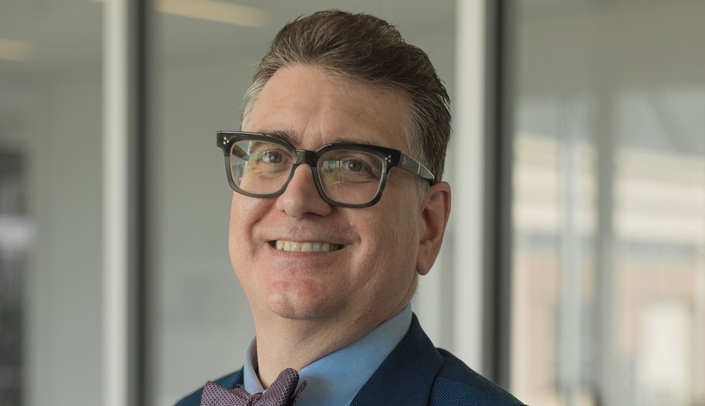Edward Peters, DMD, the new chair of epidemiology in the UNMC College of Public Health, has questions about health.
Questions such as: How big a role does a person’s neighborhood have in their risk for or recovery from cancer? How does stress, both local and on a larger scale, lead to age acceleration?
Epidemiology, he said, plays a role in answering not only both of those questions but in helping devise interventions to address and improve outcomes.
"To inform the policy that will help bring resources to people and communities that improve human health, you need good data. And in order to get that data, you need people who can design research studies that ask the right questions, which is what an epidemiologist does," Dr. Peters said.
In his own research, Dr. Peters uses classic and molecular epidemiologic tools to examine molecular and biologic heterogeneity and susceptibility of cancer and other chronic diseases.
His research examines how social determinants of health – where you live, what you eat and your economic status – influence disparate disease outcomes.
His lab currently is studying the interaction between the built environment, stress and inflammation and the development of ovarian, colorectal and oral cancers.
Once a hospital-based dentist at Brigham Women’s Hospital in Boston who treated medically compromised patients, Dr. Peters began to question the cost effectiveness of the care he was providing.
That led him to seek a degree in health policy and management and eventually a doctoral degree in epidemiology from Harvard University.
Recruited to Louisiana State University in 2004 to the new school of public health, Dr. Peters continued his work in population-based cancer registry and cancer surveillance work.
Later as department chair, he established the epidemiology data center, a core service center that provided epidemiological services to the research community, consulted on survey design, data collection and data management.
At UNMC, Dr. Peters hopes to grow the epidemiology department in terms of research and scholarship, and he said he is excited about the opportunity to collaborate with researchers in the Fred & Pamela Buffett Cancer Center.
"I like to build programs, and I think there is great potential here," he said.
Dr. Peters also brings his research on ovarian cancer survivorship and how that is impacted by where people live, as well as the advantages or disadvantages present in their community.
"The goal is to provide the data needed that would inform policy that would leverage the resources needed to help mitigate those disadvantages that may negatively impact cancer survivorship," he said.
Finally, Dr. Peters also is the primary investigator of the Women and Their Children’s Health study to examine the impact of the environmental stressors caused by the Deepwater Horizon oil spill on chronic disease.
The project is investigating the impact of social stressors on epigenetic age acceleration and chronic health disparities and testing whether the social environment, individual health behaviors, race, geography and socioeconomic status modify or mediate the association between traumatic stress and health, directly or indirectly through biologic age acceleration.
